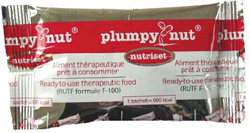The Plumpy’nut furor: International food politics in action
The New York Times Magazine has a long article this week about Plumpy’nut, the peanut butter-based product designed to feed malnourished kids in emergency situations. The product is made and patented by Nutriset, a French company.

You might think that a food product aimed at saving the lives of starving kids would be uncontroversial, but not when patents are involved. Nutriset holds intellectual property rights to this product and defends them to the hilt. The company extends its patent to line extensions of the product, as well.
Patents mean that people in developing countries who want to produce their own product based on local ingredients can’t do it. It also means that anyone making the product has to follow the formula, even if ingredients are expensive and not locally available.
In September 2007, I wrote about Plumpy’nut, describing how peanut butter had become the basis of a “ready-to-use therapeutic food” (RUTF) for aiding recovery of severely malnourished children in Africa.
The study itself is published in Maternal and Child Nutrition and the authors make the point that people administering this RUTF do not need to be medically trained so this therapy can be used at home. I’m always amazed when researchers discover that feeding malnourished children helps them to recover. Peanut butter is highly concentrated in calories and the investigators mixed in some vitamins along with it, so I guess it can be considered a superfood.
Since then, much has been written about the controversy over this product, particularly about its formula, cost, and sustainability.
Its formula includes:
- Peanut Butter
- Dry Skim Milk
- Vegetable oil
- Powdered sugar
- Minerals & vitamins
It contains about 500 calories in a 92-gram foil package.
Of these calories, one-quarter to one-third are from the added sugar. No wonder kids like it!
What about its cost? A recent article about local production of Plumpy’ nut in Niger illustrates this particular problem.
UNICEF pays US$60 to purchase and ship a box of 150 packets from the main producer and patent holder of Plumpy’nut, Nutriset, in France. It costs $65 in Niger. The difference adds up to an extra $15,000 for the 3,000 boxes purchased in Niamey every week.
“The luxury of having no production delays and not fully depending on an external provider is a price we are willing to pay,” UNICEF’s nutrition manager, Eric-Alain Ategbo, told IRIN. Ategbo said it took at least eight weeks for the nutritious peanut butter-like paste to arrive from France.
Here are some other cost concerns:
Electricity is expensive, taxes are high and money is expensive as interest rates are high. It would be cheaper if the products we use were bought locally, but they are not available. Peanuts are the only ingredient from Niger. Others, such as milk, sugar and oil, are purchased internationally. We also have the obligation to buy specific products [such as micronutrients and packaging] from Nutriset in order to respect the formula.
As for its sustainability:
- Who is going to pay for these products? And for how long?
- Does it make sense to promote a peanut-based product in countries that do not grow peanuts?
- Is it a good idea to give packaged, sweetened products to kids whose families cannot continue to provide such things once the crisis is over?
- Is it a good idea to give kids the idea that sweet things in packages are what they supposed to eat?
- Will products like this pave the way for other sweetened products in packages—soft drinks, for example?
These are all complicated issues. Read the article and ponder.

